Stories require a setting and a few workable details to set the mood. Often this is weather-related (“it was a dark and stormy night…”), but here is my sure-fire suggestion to set a scene and provoke a mood.
Add a fly. And give him human characteristics.
In his essay The Supremacy of the Housefly, Twain gives his flies a conniving personality complete with facial expressions, all to comic effect.
“All human ingenuities have been exhausted in the holy war against the fly, and yet the fly remains today just what he was in Adam’s time – independent, insolent, intrusive and indestructible. Flypaper does nothing … There are no two marksmen in fifty that can hit a fly with a wet towel at even a short range, and this method brings far more humiliation than satisfaction, because there is an expression about the missed fly which is so eloquent with derision…”
Death and decay are the most obvious roles for flies. Be careful. Don’t add too many flies. You risk going beyond a mood into the land of symbolism. Think of the novel Lord of the Flies by William Golding, where a severed head seething with flies is a stand-in for rot and corruption. The Bible is full of flies symbolizing the wrath of God and sin. That might be more than you need.
Vladimir Nabokov, the premier literary stylist, peppers his novels with flies. Here he is in Lolita describing Claire Quilty’s murder scene:
“I could not bring myself to touch him to make sure that he was really dead. He looked it; a quarter of his face gone and two flies beside themselves with a dawning sense of unbelievable luck.”
Nabokov smartly limits himself to two flies. More would be overkill. Then Nabokov goes further to give the flies human characteristics – “besides themselves with a dawning sense of unbelievable luck.” With that one phrase Nabokov puts us in the brain of the fly. I agree. Those flies were indeed lucky to be the first to feast on a human head. No sloppy seconds for these opportunists.
Here is my amateur attempt at using flies to imply death. The scene is from a story about an empty house after the death of the owner.
“His voice echoes in the living room emptied of life. Weak afternoon sun highlights a veil of suspended dust motes. A tendril of clumped lint dangles from the overhead fan. Two moths and three flies dot the windowsill. I wonder why flies always die upside down with their delicate legs in the air. The dead moths lie on their stomachs.”
If you are trying to evoke the discomforting knowledge that perfection is an unattainable goal, that something is not quite right, go for the fly. This is not an original idea. Ecclesiastes 10:1 captures the sentiment with “Dead flies cause the ointment of the apothecary to send forth a stinking savour: so doth a little folly him that is in reputation for wisdom and honour. The idiom is now popularized as the “fly in the ointment.”
Here is Nabokov’s fly in the ointment, from another scene in Lolita, describing a dismal roadside diner.
“…one half of a chocolate cake under glass, and several horribly experienced flies zigzagging over the sticky sugar-pour on the ignoble counter.”
Writing coaches recommend replacing adverbs with evocative adjectives or verbs. However, I maintain the word “horribly” is the perfect use of an adverb, both implying the human judgment on flies in general, and also, by association, describing the questionable hygiene of the diner and its food.
Here is my attempt to emulate Nabokov in this description of a similar diner, the setting for a conversation between two lonely traveling salesmen:
“The waitress aims her smoke towards the lone fly who has evaded the dangling flypaper swaying to the fan’s oscillations. As the waitress bends over to swab the counter the men notice her necklace, a cross whose stem has disappeared into her moist cleavage. Daniel turns his eyes away. James is transfixed.”
Sure, I would have loved to use “horribly experienced flies,” and an “ignoble” counter, but Nabokov scooped me. I decide that fly paper is similarly evocative.
Similar to Twain, Nabokov uses flies for comic effect, this example from his memoir Speak Memory, describing himself as a young boy playing in a tunnel created by a propped-up pillows:
“…and then, in a burst of delicious panic, on rapidly thudding hands and knees, I would reach the tunnel’s far end, push its cushion away and be welcomed by a mesh of sunshine on the parquet under the cane work of a Viennese chair and two gamesome flies settling by turns.”
It is the word “gamesome,” that perfects this image, linking the enjoyment of the child with that of the flies. Gamesome is not in my active vocabulary and I consider other options, including “fun-loving,” or “playful,” but in Nabokov’s hands, gamesome is the perfect choice. In my hands it would be contrived.
I have also turned to the fly to provide comic relief, this time in describing a lazy teenage summer.
“The chatter dies out in the stifling afternoon heat. The kids look at the floor in the thickening silence, hoping someone will start a new conversation thread. They’ve been here all afternoon; it’s too hot to go to the beach. They’ve played cards for hours, drunk too many cans of soda. Surprisingly, the dog doesn’t like popcorn, so spilled kernels dot the floor.
One beat goes by and then another. Several shift uncomfortably in their seats.
Suddenly a slap as someone tries to swat a fly on his leg, followed by a “Damn it. I missed again.” The room is energized.
Joe hops up, “Let’s have a fly killing contest, I see five flies. I know where I can get more if we need them.” He glances at the screen door, clotted with flies eager for entry.
Joe knows he can win. The indoor flies look complacent, sated on the five sets of idle bare legs splayed out before them. Joe’s hand-eye coordination at second base is well known. He reaches out and grabs a fly in mid-air.
“Got him,” he says to the astonished crowd. Let’s try something new.”
“Oh, no, you’re not going to pull his wings off, are you?” says a distressed voice.
“No something better,” says Joe, “but I need one more thing.” He leans over and plucks a long strand of blond hair from the girl sitting next to him.
“Hey cut that out. What are you doing?”
“Look what I can do.” Joe deftly holds the fly by its wings and ties the strand of hair around the fly’s neck.
“Look everyone,” he says,” A fly on the world’s smallest leash.”
The group gasps with surprise and glee as the tethered fly orbits in taut circles.
“Fly on the Leash” becomes the favorite game for the rest of the summer. Only Joe has the fine motor skills to tie the leash.”
Clearly I’m no Nabokov or Twain. I would love to add some of Nabokov’s adverbs or Twain’s wit. Maybe next revision.
Follow Liza Blue on:
Share:

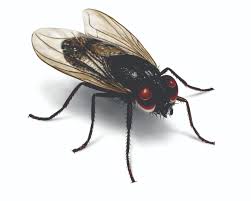
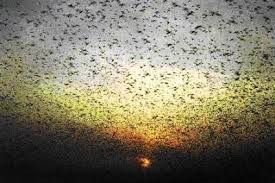
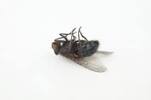
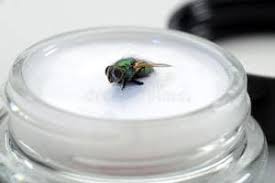
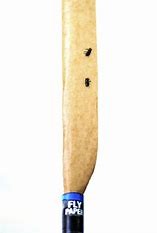
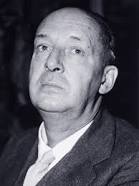

Thanks for an inspiring subject. Never thought much about flies, they’re dying at this time of year as the cold gets into their bones. Last night a polar survivor made its last desperate circles around the warmth of the 20W, bedside lamp, annoying my wife who was trying to get to sleep. She has always been afraid of aerial flies buzzing like kamikaze pilots at her body, and, like the warships of the Pacific fleet, hopeless at hitting them.
Going to add some flies into my current attempt at literary brilliance.
I have started collecting fly references beyond Twain and Nabokov. Just found one in one of Jennifer Egan’s essays!